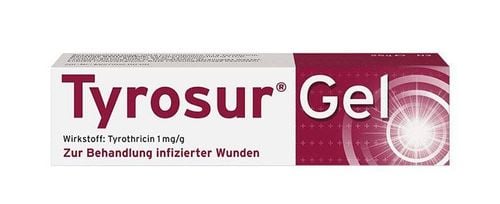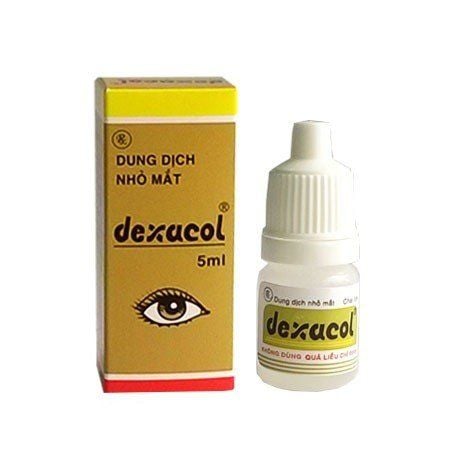This is an automatically translated article.
The drug Betamineo is a combination of two main ingredients including Dexchlorpheniramine and Betamethasone. The drug is used to relieve symptoms of allergies, conjunctivitis, keratitis, allergic rhinitis,...
1. What effect does Betamineo have?
The main ingredients of Betamineo are Dexchlorpheniramine Maleat 2mg and Betamethasone 0.25mg. Dexchlorpheniramine is an H1-antihistamine, which acts primarily on the skin, blood vessels, conjunctival mucosa, nose, bronchi and intestines.
Betamethasone is a synthetic cocorticoid with very strong glucocorticoid effects. Betamineo has a combination of Dexchlorpheniramine and Betamethasone, allowing to reduce the dose of corticosteroids while still giving the same effect as when using high doses of corticosteroids. Betamine is indicated for the treatment of the following cases:
Allergies in the respiratory tract Allergies to the skin, eyes. Eye inflammation Bronchial asthma, frequent allergic rhinitis Atopic dermatitis, contact dermatitis. Allergic conjunctivitis, keratitis, and blepharitis. Optic neuritis Betamine is contraindicated in the following cases:
Patients with hypersensitivity to any component of the drug. Patient has peptic ulcer. Patients with bacterial, viral or systemic fungal infections. The patient is in an acute asthma attack. The patient has symptoms of an enlarged prostate. Narrow angle glaucoma. The patient has bladder neck obstruction, pyloroduodenal obstruction. Children under 6 years old. The patient is taking the drug lMAO.
2. How to take and dose of Betamineo
Betamine is taken orally. Patients should take the drug after eating
Dosage should be adjusted according to the disease and severity of the patient. When symptoms are adequately controlled, the combination should be discontinued and an alternative antihistamine should be considered.
Adults and children over 12 years old: The recommended dose is 1-2 tablets, 4 times a day after meals and at bedtime. Patients should not take more than 8 tablets per day. Children from 6 to 12 years: The recommended dose is 1/2 tablet, 3 times a day after meals and at bedtime. Do not take more than 4 tablets per day.
3. Side effects of the drug Betamineo
Side effects due to Betamethasone ingredients:
Metabolism: Potassium loss, sodium retention and water retention. Endocrine: Menstrual irregularities, Cushing's syndrome, inhibition of intrauterine growth and infancy, increased insulin requirements, decreased efficacy of antidiabetic drugs in patients with diabetes. Musculoskeletal: Muscle weakness, osteoporosis, loss of muscle mass, skin and subcutaneous atrophy, sterile abscess. Gastrointestinal: Stomach ulcer and possible perforation and bleeding, pancreatitis, abdominal distention, ulcerative esophagitis. Eyes: Glaucoma, cataract. Skin: Skin rash, urticaria, angioedema. Side effects due to the ingredient Dexchlorpheniramine Maleat:
Effects on the autonomic nervous system: Drowsiness, somnolence, especially at the time of the first treatment. Causes dry mucous membranes, accommodation disorders, dilated pupils, tachycardia, urinary retention. Balance disturbance, orthostatic hypotension, dizziness, impaired memory or concentration. Motor ataxia, tremor, often occurs in the elderly. Confusion, hallucination. May cause irritation, irritability Hypersensitivity reactions: Rash, purpura, urticaria, edema, more rarely Quincke's edema, anaphylaxis. Thrombocytopenia, leukopenia, hemolytic anemia. Most side effects can be reversed or minimized by reducing the dose of the drug. The drug should be taken with food to limit gastrointestinal irritation. Calcium and vitamin D supplements may prevent osteoporosis if corticosteroids are used for a long time. Patients with a history of peptic ulcer should be given gastroprotective agents such as antacids, proton pump inhibitors, and misoprostol. Because corticosteroids increase protein catabolism, it may be necessary to increase dietary protein in patients on prolonged therapy.
4. How to deal with an overdose of Betamineo
Betamine is a combination drug, so the potential toxicity of each ingredient in the formulation should be considered. The toxicity of a single dose of Betamine is mainly due to Dexchlorpheniramine. Overdose reactions occurring with antihistamines can range from CNS depression (sedation, apnea, cardiovascular collapse) to excitatory (insomnia, hallucinations, convulsions) even even cause death. Other signs of overdose include tinnitus, dizziness, ataxia, and hypotension. Taking an overdose of glucocorticoids for a few days is unlikely to cause harm unless the patient is at particular risk because of an existing medical condition or is taking other drugs with the potential to interact with Betamethasone.
Acute overdose: Immediate induction of vomiting or gastric lavage is required. Should combine symptomatic treatment and supportive treatment for the patient. Seizures should be managed with short-acting drugs such as thiopental. Note the patient's fluid and electrolyte control, paying particular attention to the sodium and potassium balance.
5. But be careful when using the drug Betamineo
Caution when using the drug in case of hypertension, congestive heart failure, recent myocardial infarction, diabetes mellitus, epilepsy, glaucoma, hypothyroidism, osteoporosis, gastrointestinal ulcers, disorders psychosis and renal/liver failure. Children may be at increased risk for some side effects of the drug. In addition, corticosteroids can cause growth retardation in children. Patients receiving corticosteroid therapy are at increased risk of infection. On the other hand, the symptoms of an infection may be masked until a late stage. Patients with active or latent TB should not receive corticosteroids except in very rare cases as adjuncts to anti-tuberculosis therapy. Patients with latent TB should be closely monitored and treated with antituberculosis prophylaxis if the drug is on prolonged use. Use with caution in patients with measles. Live vaccines should not be given to patients receiving high-dose systemic corticosteroid therapy and, at least for the next three months, dead and toxoid vaccines may be used, although response may be reduced. During long-term use of Betamine, the patient must be monitored periodically. It may be necessary to reduce sodium intake and supplement calcium and potassium in the patient. The sedative effect of Dexchlorpheniramine Maleat is increased with alcohol intake and when used concomitantly with other sedatives. Because the excipients contain lactose, it should not be used in patients with lactose intolerance, lapp lactase deficiency, glucose-galactose intolerance. Patients on prolonged treatment are at risk of tooth decay because the anticholinergic effect can cause dry mouth. Ability to drive and use machines: Betamine may cause drowsiness, dizziness and impaired mobility in some patients. Therefore, caution should be exercised when administering the drug to patients who frequently drive and operate machinery. Betamine should be used with caution in the elderly (>60 years of age) because these patients are often more susceptible to anticholinergic side effects (dry eyes, urinary retention, blurred vision). Betamine should be used during pregnancy only when absolutely necessary. Use of the drug during the third trimester of pregnancy may increase the risk of an adverse drug reaction (neonatal seizures). Betamine can be excreted in breast milk and cause many unwanted effects in the baby. Therefore, the manufacturer recommends not to use the drug in women who are breast-feeding. Drug interactions: Other drugs may interact, increasing side effects or reducing the effectiveness of the drug. Therefore, it is best for patients to inform their doctor or pharmacist of all prescription drugs, over-the-counter drugs, vitamins, functional foods, herbs that are being used for advice and appropriate adjustment. The article has provided information on dosage, uses and notes during the use of Betamine. Patients should consult a medical professional before use to ensure the effectiveness and safety of the drug.
Please dial HOTLINE for more information or register for an appointment HERE. Download MyVinmec app to make appointments faster and to manage your bookings easily.













